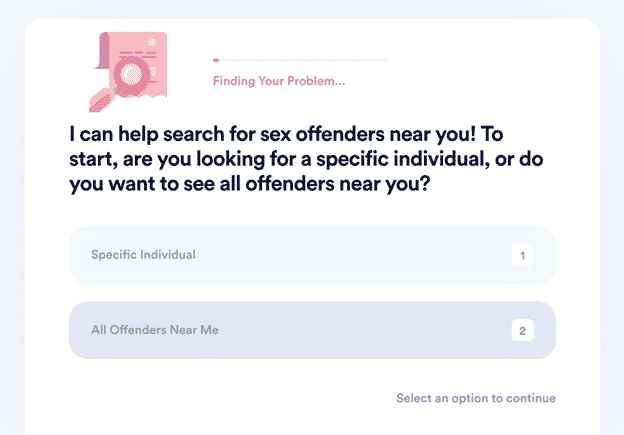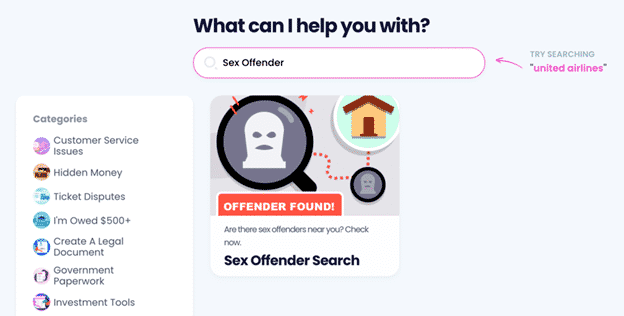Texas Sex Offender Law Examined With DoNotPay
Texas has the largest number of registered sex offenders of all the states.
With nearly 100,000 registrants, there is a strong chance of you having a sex offender in your neighborhood.
DoNotPay is here to help you protect yourself, with a breakdown of how Texas sex offender law works to keep you and your family safe from harm.
What Are the Texas Sex Offender Laws?
Sex offenses in Texas are classified according to the federal three-tier system, as follows:
- Tier I
- Tier II
- Tier III
Tier I
Offenses of the lowest classification are usually non-violent and non-penetrative. They can include:
- Possession of illegal pornography
- Acts of public indecency
- Unwanted or unsolicited sexual contact
Tier II
Tier II offenses involve pubescent minors or acts of coercion without violence. Examples of tier II offenses are:
- Production or distribution of illegal pornography
- Sexual acts with minors aged between 13 and 16
- Prostitution or enticement of a minor
Any offense committed is automatically classified as tier II if the offender has a previous tier I conviction.
Tier III
The most serious offenses are classified as tier or level III and involve violence or sexual acts with prepubescent minors. Typical tier III offenses include:
- Aggravated sexual assault
- Rape
- Sexual acts with a child aged 12 or under
- Kidnapping with a sexual intent
- Child trafficking
What Happens to Sex Offenders in Texas?
Depending on the severity of their crime, sex offenders in Texas are punished as follows:
| Misdemeanor or Felony | Class or Degree | Sentence Range |
| Misdemeanor | Class A | Up to a year in prison and a $4,000 fine |
| Class B | Up to 180 days prison and a $2,000 fine | |
| Class C | Fine up to $500 | |
| Felony | State jail felony | 180 days to two years prison |
| Third-degree | Two to ten years prison | |
| Second-degree | Two to 20 years prison | |
| First-degree | Five to 99 years prison |
Offenders may also be placed on probation instead of, or in addition to, a custodial sentence.
After completing their sentence, Texas sex offenders are required to place themselves on the state sex offender registry.
The length of time they must remain on the registry depends on the risk they pose to the community—this is determined by local risk assessment boards in each county.
How Does the Texas Sex Offender Registry Work?
Upon completion of any custodial sentence or when offenders are placed on parole or probation, their county risk assessment board will decide how much of a risk they pose to society and impose a term on the state sex offender registry.
The board will categorize an offender as:
- Low risk—with a low likelihood of re-offending
- Medium risk—with a possibility of recidivism
- High risk—with a high risk of re-offense
Depending on their risk classification, offenders are required to place themselves on the sex offender registry for the following periods:
| Risk Assessment Level | Time on Registry |
| Low risk | Ten years |
| Medium risk | 10–25 years |
| High risk | Lifelong |
The Texas sex offender registry contains the following details about each offender:
- Name
- Recent photo
- Physical description
- Date of birth
- Home address
- Details of the sex offense
To uphold sex offenders’ rights in Texas, the state prohibits the following details from being placed on the registry:
- Driver’s license number
- Social Security details
- Employer’s name or address
- Phone numbers or email addresses
Under Megan’s Law, sex offender registries across the nation are accessible to the public, so Texas tries to limit the risk of victimization or vigilantism by keeping this information out of the public domain.
Authorities are still able to map the whereabouts of Texas sex offenders using registry information, though. Unregistered offenders or those who fail to update their registrations every year face severe penalties.
What Restrictions Are Placed on Texas Sex Offenders?
Once they are registered in Texas, sex offenders are subject to several restrictions on their movement and activities.
These sanctions can include:
- Travel restrictions
- Employment limitations
- Residency rules
- Internet and social media limitations
Travel Restrictions
The highest-risk Texas sex offenders have to ask for permission to travel outside their county of residence. Interstate travel becomes difficult, and international travel is only possible after extensive procedures have been followed.
Employment Limitations
Most sex offenders are prohibited from working with children, and many professional licensing associations—including lawyers, accountants, and realtors—will not entertain applications from registered sex criminals.
Registered offenders may also be prohibited from taking part in community events.
Residency Rules
Texas sex criminals normally have to find accommodation that is more than 500 feet away from any place where children congregate, including:
- Schools
- Playgrounds
- Daycare centers
- School bus stops
- Sports facilities
Internet and Social Media Limitations
Depending on the judgment of the risk assessment board, sex offenders in Texas may face restrictions on their social media activities. The highest-risk criminals may even be prohibited from accessing the internet.
How Can the Texas Registry Help You Stay Safe?
With the high number of registered sex offenders in Texas, you could be justified in feeling at risk in your neighborhood.
The Texas sex offender registry is openly accessible to the general public, so you can use it to search for:
- Registered sex offenders in your neighborhood
- Specific sex offenders that you know by name
The registry is easy to search either by address or name and allows you to gain some peace of mind that you are not in danger.
DoNotPay wants to make sure your safety is guaranteed for the long term, though—this is why we make it easy for you to on any changes to your search results!
Peace of Mind With DoNotPay’s Sex Offender Search Feature!
Your safety is as important to us as it is to you!
With DoNotPay’s Sex Offender Search product, you can check your neighborhood for registered sex offenders or search for the whereabouts of a specific criminal. If you choose, you can even receive weekly updates to make sure you don’t miss any changes!
Here’s what you need to do to use our feature:
- in your web browser
- Click on our Sex Offender Search feature
- Type in the name of the offender or your address and set the search parameters
Once we know what info you are looking for, we will send your report in an !

How Else Can DoNotPay Help Me Stay Safe?
DoNotPay has a wealth of information on specific areas in Texas, as well as help for other states.
If you are looking for specific areas in Texas, you can try our info on sex offenders in:
If you need details on sex offenders in other states, here are some examples of what we can offer:
| Missouri | Indiana | Georgia |
| Wisconsin | Utah | Florida |
| California | Iowa | Pennsylvania |
| New York | Virginia | Kentucky |
| Michigan | Maryland | North Carolina |
| Ohio | Illinois | Tennessee |
Why Waste Money on Lawyers When You Have DoNotPay?
Although certain tasks require you to get a lawyer’s assistance, you don’t have to spend hundreds of dollars for their service. With DoNotPay, you can avoid figuring out the jargon and have peace of mind dealing with bureaucratic tasks the easy way.
Need help preparing for a small claims court appearance or composing a neighbor’s complaint letter? Looking for an easy but efficient way to draft a power of attorney or divorce settlement agreement? Use DoNotPay’s features to draft documents, send demand letters to companies, request refunds, claim warranties, and file insurance claims while still saving a pretty penny!
Communication Is the Key
The best way to resolve issues is through clear communication, but companies don’t always make it easy to do so. That’s why DoNotPay came up with various features that help make communicating and solving problems a piece of cake. Sign up for our app and forget about waiting in lines for hours to speak to a customer service rep!
Here’s what you can do with our app:
- Contact an incarcerated loved one
- Fax documents online with ease
- Make a DMV appointment
- Reach a customer service rep without hour-long waits
- Mail letters from your home or office
- Stop text spam


